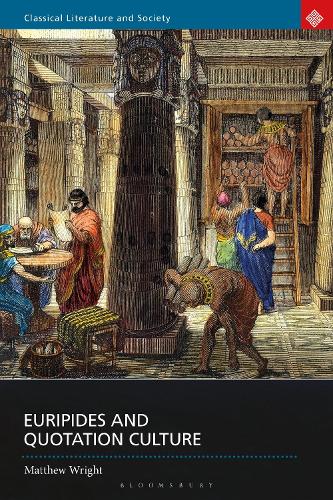
Euripides and Quotation Culture
(Hardback)
Available Formats
Publishing Details
Euripides and Quotation Culture
By (Author) Dr Matthew Wright
Bloomsbury Publishing PLC
Bloomsbury Academic
8th August 2024
United Kingdom
Classifications
Professional and Scholarly
Non Fiction
Literary studies: ancient, classical and medieval
Classic plays / drama
882.01
Physical Properties
Hardback
224
Width 162mm, Height 236mm, Spine 18mm
480g
Description
Presenting a new approach to Euripides plays, this book explores the playwrights ancient tragedies in relation to quotation culture. Treating extant works and lost works side-by-side, Matthew Wright presents a selective survey of ways in which Euripidean tragedy was quoted within antiquity, both in social contexts (on the comic stage, at symposia, in law courts, in education) and in different literary genres (drama, biography, oratory, philosophy, literary scholarship, history and anthologies). There is also a discussion of the connection between quotability and classic status, where Wright asks what quotations can tell us about ancient reading habits. The implication is that Euripides actively participated in quotation culture by deliberately making certain portions of his plays stand out as especially quotable. Within classical antiquity, Euripides was the most widely quoted author apart from Homer. His plays are full of quotable quotes, which were repeated so often that they acquired a life of their own. Hundreds of famous verses from Euripidean drama circulated widely within the ancient world, even after the plays in which they originally featured became forgotten or vanished completely. Indeed, the majority of Euripides tragedies now survive only in the form of scattered quotations, otherwise known to us as fragments. It is this corpus of fragmentary quotations, along with his extant plays, that makes Euripides such an interesting case study in the world of quotation culture. This book is the first of its kind to understand Euripides work through this lens, as well as opening up quotation culture as a major theme of interest within classical scholarship.
Reviews
Euripides and Quotation Culture introduces students, scholars and anyone interested in the reception of one of the most popular and influential authors of ancient Greece, to an exciting new approach that until now has been confined mostly to English and other modern languages and literatures. -- John Gibert, Associate Professor of Classics, University of Colorado Boulder, USA
Author Bio
Matthew Wright is Professor of Greek at the University of Exeter, UK. He has published widely on Greek tragedy and comedy, including The Lost Plays of Greek Tragedy (Volume 2): Aeschylus, Sophocles and Euripides (Bloomsbury, 2018), The Lost Plays of Greek Tragedy (Volume 1): Neglected Authors (Bloomsbury, 2016) and The Comedian as Critic (Bloomsbury, 2012).
